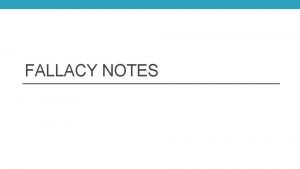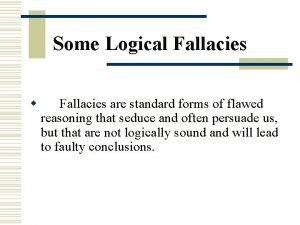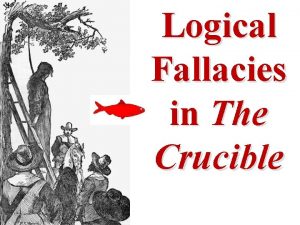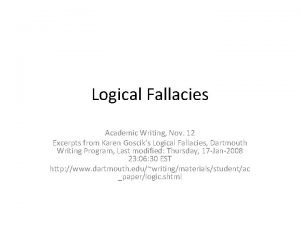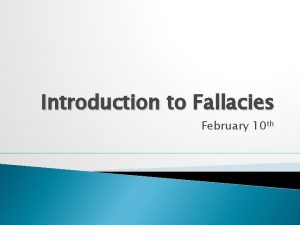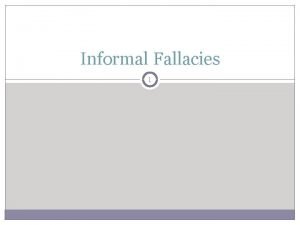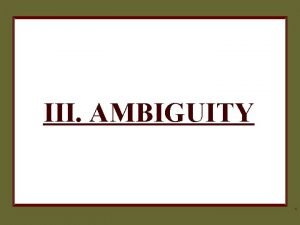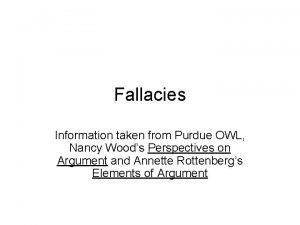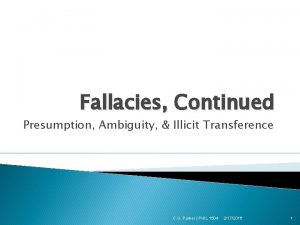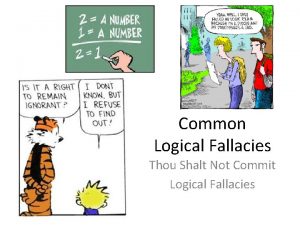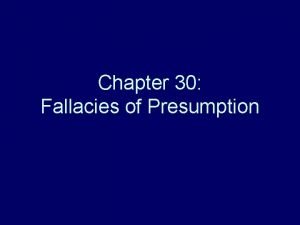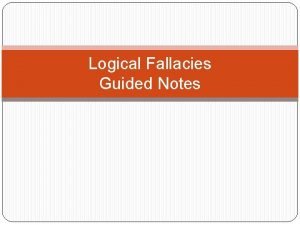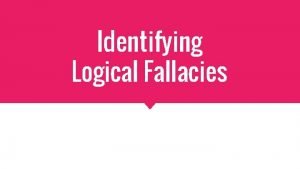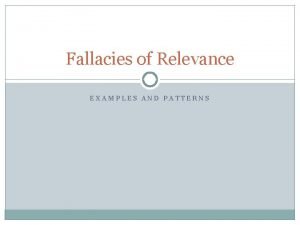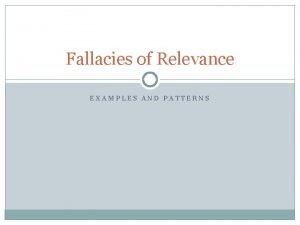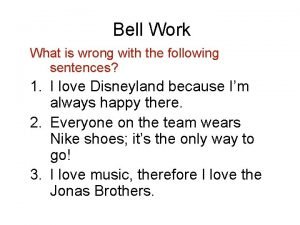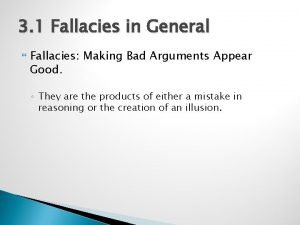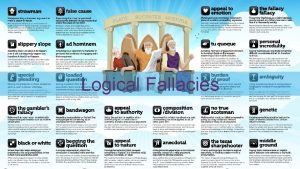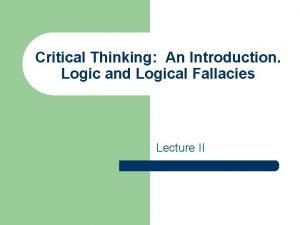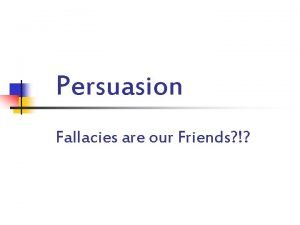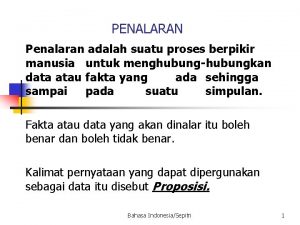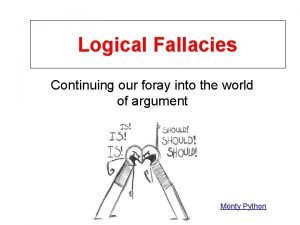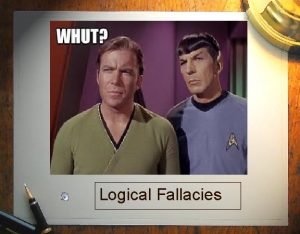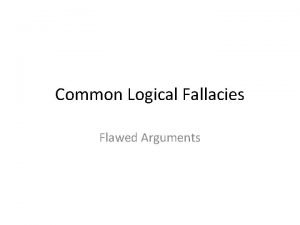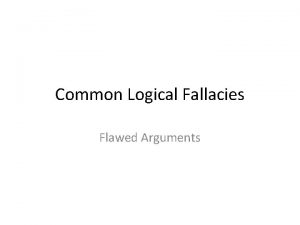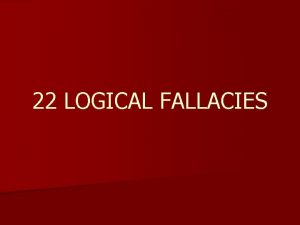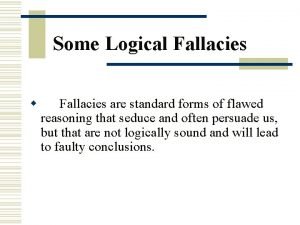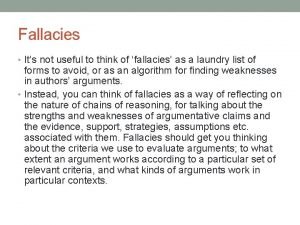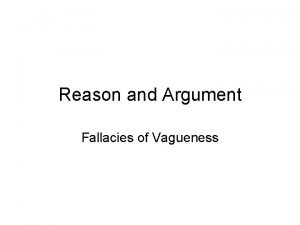Fallacies Vince Definition of Fallacies Fallacies is an




















































- Slides: 52

Fallacies Vince

• Definition of Fallacies • Fallacies is an error in reasoning. • Basically being wrong about the facts. • A fallacy is an "argument" are details/facts given that does not provide support or evidence. • A deductive fallacy is a deductive argument that is invalid. Meaning it could a factual statement but still has a false conclusion. • An inductive fallacy is less formal than a deductive fallacy. They are simply "arguments" which appear to be inductive arguments, but the information given doesn’t support it. • In such cases, even if the information was true, the conclusion would not be more likely to be true.

Ad-Hominem • Known as name-calling, this fallacy is a direct or indirect attack on a person. • For Example: “Bob can't be right because he is an idiot. ” Bandwagon/celebrity appeal • The reader should agree with a premise because a majority or a well-known person agrees with the premise. • For Example: “Everyone recognizes this bill will help our children. ” • Avoiding Fallacies

Either/or reasoning Slippery slope • There can be only one cause • One minor fact is true, then or one solution in an issue. • For Example: “The only way to keep our children safe is to ban video games. ” a larger premise must be too, without any further proof. • For Example: Marc didn’t watch basketball last week, therefore, Marc will never watch basketball. • Avoiding Fallacies

Ad-populum Circular reasoning • Argument on emotional • A restatement of the • For Example: All true • For Example: There are not appeals rather than facts from reliable sources. Americans want to ban this book. problem itself as a cause of the problem. enough seats because most of them are filled. • Avoiding Fallacies

Ad Hominem Attacking somebody, or casting doubt on their character as a way to discredit their argument. Logical Form: 1. Person a makes claim x 2. Person b makes an attack on person a 3. Therefore a’s claim is false Example: “You can’t believe what jack is saying about the proposed policy. He doesn’t even have a job. ” [nizkor. org/features/fallacies]

Ad Hominem Tu Quoque Claiming the argument is flawed by pointing out that the one making the argument is not acting consistently with the claims of the argument. Logical Form: 1. Person 1 is claiming that y is true 2. But person 1 is acting as if y is not true 3. Therefore y must not be true Example: “You shouldn’t be eating that, it’s been scientifically proven that fast food is not good for your health. ” “You eat fast food all the time, so that can’t be true. ” [nizkor. org/features/fallacies]

Appeal To Authority Using an authority as evidence in your argument, when the authority is not really an authority on the facts relevant to the argument. Logical Form 1. According to person a, x is true 2. Therefore x is true Example: “Marilyn Monroe uses this shampoo, so it must be good!” [nizkor. org/features/fallacies]

Appeal to Belief When the claim is supported by the fact that most people in general or of a particular group believe it to be true. Accepting another person’s belief or many peoples belief without demanding evidence. Logical Form: 1. A lot of people believe x 2. Therefore x must be true Example: Up until the late 16 th century, most people believed that the earth was the center of the universe. [nizkor. org/features/fallacies]

Appeal to Common Practice This fallacy assumes that if other people do something, it is a reasonable thing to do. Often used as an excuse. Logical Form: 1. many people do x 2. therefore x is right/acceptable/justified Example: “I know cheating is wrong. But everyone does it, so it’s okay. ” [nizkor. org/features/fallacies]

Appeal to Consequences of a Belief Concluding an idea is true or false because the consequences of it being true or false are desirable or undesirable. Logical Form: 1. x is true because if people did not accept x to be true then there would be negative consequences (and vice versa) 2. x is true/ because accepting that x is true has positive consequences (and vice versa) Example: If evolution is true, then humans are just intelligent bipedal apes, I don’t want to be an ape, therefore evolution is untrue. [nizkor. org/features/fallacies]

Appeal to Emotion Manipulating an emotion response in place of a valid or compelling argument. Logical Form: 1. x must be true 2. Imagine how said it would be if it weren’t true Example: “ If you care about your children’s success you will buy these encyclopedias, that is unless you don’t want them to be successful in the future. ” [nizkor. org/features/fallacies]

Appeal to Fear When fear, not based on evidence or reason, is being used as the motivator to get others to accept an idea. Logical Form: 1. If you don’t accept x as true, something bad will happen to you 2. Therefore x must be true Example: “If you don’t graduate from high school, you will live in poverty for the rest of your life. ” [nizkor. org/features/fallacies

Fallacies 9 -17 Miranda Mussoline Tiara Zhan`e

9) Appeal to Flattery: “Sucking Up”. . occurs when person A wants something from person B, therefore person A compliments or “agrees” with person B in order to get what they want from person B. (Nizkor. org) In some cases this tactic may seem like the best way to get what you want, when you want it. However, a huge part of being persuasive is having a voice and being able to stand up for what you believe and feel, regardless of who agrees or disagrees. Stand your ground and build your case. I’d personally take truth and passion over bull and booty kissing any day.

9) Appeal to Flattery: “Sucking Up” Sometimes people may feel like they have to “suck up” to someone in a higher position than them, this is not true. 1. Always remain professional 2. Be consistent 3. Don’t slack off 4. DON’T BE A YES MAN !! 5. Be your own boss http: //www. manhelper. com

10) Appeal to Novelty: . . . occurs when people except a new idea or tactic just because it is newer than the older or traditional. (Nizkor. org) The grass is not always “greener” on the other side.

11) Appeal to Pity …occurs when actual evidence or facts are replaced with emotion evoking claims (which can be true, or false). (Nizkor. org) http: //www. youtube. com/watch? v=7 u. XQo. D 3 YLl. M

12) Appeal to Popularity The idea that a claim is true just because someone who is favorable says it is. http: //www. youtube. com/watch? v=iu. NUb. Ak. Jaj. E

13) Appeal to Ridicule: • Fallacy in which ridicule or mockery is substituted for evidence in an "argument. “ (nizkor. org) • Mock the other person's claim and argument. Make fun of it. Get people to laugh at it. (changingminds. org) • I think it means an appeal of an emotion where an argument is made by presenting the others argument that makes it seem ridiculous. • Example: (nizkor. org) "Sure my worthy opponent claims that we should lower tuition, but that is just laughable. "

14. ) Appeal to Spite: • “Is substituted for evidence when an “argument” is made against a claim” (nizkor. org) • “Spitefulness is a negative emotions can be based in the needs for control and status, sometimes it is unfounded at other times it comes from a need for justice and revenge” (changingminds. org) • What I think it means is a type of emotion where an argument is made through exploiting people’s bitterness Example: (nizkor. org) Bill: “I think that Jane did a great job this year. I’m going to nominate her for the award. ” Dave: “Have you forgotten last year? Remember that she didn’t nominate you last year. ” Bill: You’re right. I’m not going to nominate her. ”

15. ) Appeal to Tradition: • “Occurs when it is assumed that something is better or correct, simply because it is older, traditional, or ‘always has been done’. ” (nizkor. org) • “Common logical fallacy that occurs when it is assumed that something is better or correct simply because it is older. ” (rationalwiki. org) • What I think it means is a basis that has a long standing tradition behind it.

15. ) Appeal to Tradition: • Example: (csusm. edu) “Just like grandma use to make”

16. ) Bandwagon: • “Which is a treat of rejection by one’s peers (or peer pressure) is substituted for evidence in an argument. ” (nizkor. org) • “The bandwagon fallacy is committed by arguments that appeal to the growing popularity of an idea as a reason for accepting it as true. ” (logicalfallacies. info) • What I think it means is that an argument has flaws. • Example: (wiki. answers. com) “everyone’s doing it! Come on, you do it too!”

17. ) Begging the Question: • “Which the premises include the claim that the conclusion is true or (directly or indirectly) assume that the conclusion is true. ” (nizkor. org) • “A proposition which requires proof is assumed without proof; in order to charitably entertain the argument, it must be taken as given ‘in some form of the very proposition to be proved, as a premise from which to deduce. ” (en. wikipedia. org) • What I think it means is this type of fallacy is when the conclusion of an argument is assumed in the phrasing of the question itself.

17. ) Begging the Question: • Example: (nizkor. org) “if such actions were not illegal, then they would not b prohibited by the law. ”

Sources • http: //www. manhelper. com/money_career/10_simple_ways_to • • • _make_your_boss_like_you_without_sucking_up http: //www. nizkor. org/features/fallacies/appeal-to-flattery. html http: //www. youtube. com/watch? v=7 u. XQo. D 3 YLl. M http: //www. youtube. com/watch? v=iu. NUb. Ak. Jaj. E http: //changingminds. org/ http: //rationalwiki. org/wiki/Main_Page http: //www. csusm. edu/ http: //www. logicalfallacies. info/ http: //wiki. answers. com/ http: //en. wikipedia. org/wiki/Main_Page

FALLACIES Ashley Ampaabeng CSA 100 A

CONFUSING CAUSE AND EFFECT • A and B regularly occur together. • Therefore A is the cause of B. • This fallacy requires that there is not, in fact, a common cause that actually causes both A and B. Nizkor. org

EXAMPLE • Bill sets out several plates with bread on them. After a couple days, he notices that the bread has mold growing all over it. Bill concludes that the mold was produced by the bread going bad. When Bill tells his mother about his experiment, she tells him that the mold was the cause of the bread going bad and that he better clean up the mess if he wants to get his allowance this week. Nizkor. org

DIVISION • The fallacy of Division is committed when a person assumes that what is true of a whole must also be true of its components and justification for that inference is not provided. Nizkor. org

TYPES OF DIVISION Examples • 1) a person reasons that what is true of the whole must also be true of the parts and • 2) the person fails to justify that inference with the required degree of evidence • "Bill lives in a large building, so his apartment must be large. " • “Every celebrity that worked with Stanley Kubrick became more popular, unlike Justin Timberlake who is not popular. ” Nizkor. org

FALSE DILEMMA • If a person uses the following pattern of "reasoning": • Either claim X is true or claim Y is true (when X and Y could both be false). • Claim Y is false. • Therefore claim X is true. Nizkor. org

EXAMPLE • Bill: "Jill and I both support having prayer in public schools. " • Jill: "Hey, I never said that!" • Bill: "You're not an atheist are you Jill? " Nizkor. org

GAMBLER'S FALLACY • When a person assumes that a departure from what occurs on average or in the long term will be corrected in the short term. The form of the fallacy is as follows: • X has happened. • X departs from what is expected to occur on average or over the long term. • Therefore, X will come to an end soon. Nizkor. org

EXAMPLE Jane and Bill are talking: • Jane: "I'll be able to buy that car I always wanted soon. " • Bill: "Why, did you get a raise? " • Jane: "No. But you know how I've been playing the lottery all these years? " • Bill: "Yes, you buy a ticket for every drawing, without fail. " • Jane: "And I've lost every time. " • Bill: "So why do you think you will win this time? " • Jane: "Well, after all those losses I'm due for a win. "

EXCLUDED MIDDLE This can also be known as false dichotomy. • • Excluded middle is when there is no grey area. • Right or wrong. Guilty or non guilty. You like it or you don’t. http: //www. nobeliefs. com/

HALF TRUTH • A statement that includes some element of truth. • The purpose and or consequence of a half-truth is to make something that is really only a belief appear to be knowledge. • Example: "You should not trust Peter with your children. I once saw him smack a child with his open hand. " In this example the statement could be true, but Peter may have slapped the child on the back because he was choking. http: //www. nobeliefs. com/

LOADED QUESTIONS • Embodies an assumption that, if answered, indicates an implied agreement. • Example: “Have you stopped beating your wife yet? ” • "Yes, I have stopped beating my wife", which entails "I was beating my wife. " • http: //www. fallacyfiles. org

MEANINGLESS QUESTION • If everything proved possible, then the possibility exists for the impossible, a contradiction. • Or, asking a question that cannot be answered with any sort of rational meaning. http: //www. logicallyfallacious. com http: //www. nobeliefs. com

Melissa Mckinney Fallacies 32 -35

32. Personal Attack When someone criticizes someone’s claim/claims based on the person rather than the claim itself. (i. e. discriminate or judge) Example 1: Sara tells the class that drunk driving can cause accidents and Michelle, the eldest says “she’s too young; she doesn’t know what she is talking about” Example 2: “He said that they are planning to legalize marijuana in PA but, he is untrustworthy so we can’t believe him. ”

33. Poisoning the well Uses negative emotions to distract the audience from what the speaker is saying Example 1: “That guy is a scumbag, you shouldn’t talk to him” Example 2: someone tells you that the way a teacher teaches is bad, so when you go into class you go in with that mind set so you also think that her way of teaching is bad

34. Post Hoc Since that event followed this one, that event must have been caused by this one Example 1: Example 2: You touch the bottom of a shoe, a week later you get a wart, and therefore you must have gotten the wart from touching the bottom of the shoe.

35. Questionable Cause Concluding that one thing caused another, just because they are regularly associated Example 1: I didn’t make my bed this morning, and I fell off of my bed when I went to sleep that night, so I should make my bed the next morning so that I won’t fall off while sleeping. Example 2:

FALLACIES FALLACY #18: – BIASED SAMPLE FALLACY #33: -POISONING THE WELL FALLACY #36: -RED HERRING By: Frankie Cruz

BIASED SAMPLE “Description of Biased Sample This fallacy is committed when a person draws a conclusion about a population based on a sample that is biased or prejudiced in some manner. It has the following form: Sample S, which is biased, is taken from population P. Conclusion C is drawn about Population P based on S. The person committing the fallacy is misusing the following type of reasoning, which is known variously as Inductive Generalization, and Statistical Generalization: X% of all observed A's are B''s. Therefore X% of all A's are Bs. “ http: //www. nizkor. org/features/fal lacies/biased-sample. html

POISONING THE WELL “Description of Poisoning the Well This sort of "reasoning" involves trying to discredit what a person might later claim by presenting unfavorable information (be it true or false) about the person. This "argument" has the following form: Unfavorable information (be it true or false) about person A is presented. Therefore any claims person A makes will be false. This sort of "reasoning" is obviously fallacious. The person making such an attack is hoping that the unfavorable information will bias listeners against the person in question and hence that they will reject any claims he might make. However, merely presenting unfavorable information about a person (even if it is true) hardly counts as evidence against the claims he/she might make. This is especially clear when Poisoning the Well is looked at as a form of ad Homimem in which the attack is made prior to the person even making the claim or claims. The following example clearly shows that this sort of "reasoning" is quite poor. “ i. e. Mitt Romney http: //www. nizkor. org/features/fall acies/poisoning-the-well. html

RED HERRING “Description of Red Herring A Red Herring is a fallacy in which an irrelevant topic is presented in order to divert attention from the original issue. The basic idea is to "win" an argument by leading attention away from the argument and to another topic. This sort of "reasoning" has the following form: Topic A is under discussion. Topic B is introduced under the guise of being relevant to topic A (when topic B is actually not relevant to topic A). Topic A is abandoned. This sort of "reasoning" is fallacious because merely changing the topic of discussion hardly counts as an argument against a claim. “ *When you get angry and tell someone “That has nothing to do with what we’re talking about, they just failed at attempting to use a Red Herring. i. e“ I think there is great merit in making the requirements stricter for the graduate students. I recommend that you support it, too. After all, we are in a budget crisis and we do not want our salaries affected. " http: //www. nizkor. org/features/falla cies/red-herring. html

SOURCES http: //www. nizkor. org/features/fallacies/red-herring. html http: //www. nizkor. org/features/fallacies/poisoning-the-well. html http: //www. nizkor. org/features/fallacies/biased-sample. html • Dr. Accardi’s English 471

Straw Man The Straw Man fallacy is committed when a person simply ignores a person's actual position and substitutes a distorted, exaggerated or misrepresented version of that position. "Fallacy: Straw Man. " Fallacy: Straw Man. N. p. , n. d. Web. 01 Apr. 2013. By exaggerating, misrepresenting, or just completely fabricating someone's argument, it's much easier to present your own position as being reasonable, but this kind of dishonesty serves to undermine honest rational debate. "Strawman. " Thou Shalt Not Commit Logical Fallacies. N. p. , n. d. Web. 01 Apr. 2013. • • The straw man fallacy is based upon person Y using person X’s position but distorting it in order to present it for themselves. Examples This is everywhere in politics. For example, right after President Bush took office in 2001; he pushed for a new testing system for schools, and then argued that everybody opposed to that system was disinterested in holding schools accountable for their failures. This simply wasn't true, as there were plenty of alternatives offered by his political opponents. •

Two Wrongs Make A Right When a person attempts to justify an action against another person because the other person did take or would take the same action against him or her. "Two Wrongs Make a Right. " Two Wrongs Make a Right. N. p. , n. d. Web. 01 Apr. 2013. Two Wrongs Make a Right is a fallacy in which a person "justifies" an action against a person by asserting that the person would do the same thing to him/her, when the action is not necessary to prevent B from doing X to A. "Fallacy: Two Wrongs Make a Right. " Fallacy: Two Wrongs Make a Right. N. p. , n. d. Web. 01 Apr. 2013. • • The two wrongs make a right fallacy is based upon someone doing the same action that someone else did to them even if it is wrong. Examples Russia in 1977 responding to President Carter's attack on them for violation of human rights: "As for the present state of human rights in the U. S. , it is characterized by the following: millions unemployed, racial discrimination, social inequality of women, infringement of citizens' personal freedom, growth of crime, and so on. " •
 Vince low artist
Vince low artist Vince buonaccorsi
Vince buonaccorsi Linear automobile depreciation
Linear automobile depreciation Vince have thinner walls than arteries
Vince have thinner walls than arteries If vince charged $200
If vince charged $200 Saw sze vince
Saw sze vince Vince aurentz
Vince aurentz Vince humphries
Vince humphries Saw sze vince
Saw sze vince Vince moura
Vince moura Vince austin
Vince austin Vince gilbert
Vince gilbert Vince daly
Vince daly What is logical fallacy
What is logical fallacy Appeal to tradition
Appeal to tradition Logical fallacies in the crucible
Logical fallacies in the crucible Fallacies in academic writing
Fallacies in academic writing Accident fallacy
Accident fallacy Falacia de ignoratio elenchi
Falacia de ignoratio elenchi Ambiguity examples
Ambiguity examples Petitio principii example
Petitio principii example Purdue logical fallacies
Purdue logical fallacies Amphiboly
Amphiboly Exegetical fallacies
Exegetical fallacies Jumping on the bandwagon
Jumping on the bandwagon Thou shalt not commit logical fallacies
Thou shalt not commit logical fallacies Begging the question fallacy
Begging the question fallacy Fallacies of ambiguity
Fallacies of ambiguity Rhetorical devices and logical fallacies
Rhetorical devices and logical fallacies Appeal to pity fallacy
Appeal to pity fallacy Logical fallacies guided notes key
Logical fallacies guided notes key Logical fallacies referee
Logical fallacies referee Fallacies of relevance examples
Fallacies of relevance examples Example of relevance
Example of relevance Appeal to vanity fallacy
Appeal to vanity fallacy Logical fallacies detector
Logical fallacies detector Logical fallacies bell ringer journal
Logical fallacies bell ringer journal Fallacies breaking bad
Fallacies breaking bad The crucible logical fallacies
The crucible logical fallacies Logical fallacy propaganda
Logical fallacy propaganda Dogmatism fallacy
Dogmatism fallacy Strawman argument
Strawman argument Logical fallacies
Logical fallacies Fallacies of weak induction
Fallacies of weak induction Fallacy of division
Fallacy of division Silogisme
Silogisme Fallacy of false dichotomy
Fallacy of false dichotomy Argument from ignorance
Argument from ignorance Myth and fallacies about non-communicable diseases
Myth and fallacies about non-communicable diseases Logical fallacies
Logical fallacies Lexicons
Lexicons Red herring in animal farm
Red herring in animal farm Fallacies in the media
Fallacies in the media













